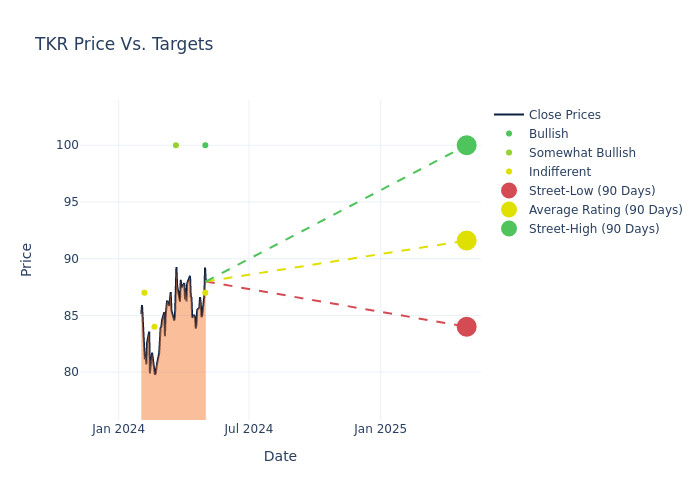Timken (NYSE:TKR) underwent analysis by 5 analysts in the last quarter, revealing a spectrum of viewpoints from bullish to bearish.
Summarizing their recent assessments, the table below illustrates the evolving sentiments in the past 30 days and compares them to the preceding months.
| Bullish | Somewhat Bullish | Indifferent | Somewhat Bearish | Bearish | |
|---|---|---|---|---|---|
| Total Ratings | 1 | 1 | 3 | 0 | 0 |
| Last 30D | 1 | 0 | 1 | 0 | 0 |
| 1M Ago | 0 | 0 | 0 | 0 | 0 |
| 2M Ago | 0 | 1 | 0 | 0 | 0 |
| 3M Ago | 0 | 0 | 2 | 0 | 0 |
Analysts' evaluations of 12-month price targets offer additional insights, showcasing an average target of $91.6, with a high estimate of $100.00 and a low estimate of $84.00. This current average has increased by 6.76% from the previous average price target of $85.80.

Breaking Down Analyst Ratings: A Detailed Examination
In examining recent analyst actions, we gain insights into how financial experts perceive Timken. The following summary outlines key analysts, their recent evaluations, and adjustments to ratings and price targets.
| Analyst | Analyst Firm | Action Taken | Rating | Current Price Target | Prior Price Target |
|---|---|---|---|---|---|
| Chris Dankert | Loop Capital | Raises | Hold | $87.00 | $78.00 |
| Stanley Elliott | Stifel | Raises | Buy | $100.00 | $92.00 |
| Bryan Blair | Oppenheimer | Raises | Outperform | $100.00 | $97.00 |
| David Raso | Evercore ISI Group | Maintains | In-Line | $84.00 | $84.00 |
| Joe Ritchie | Goldman Sachs | Raises | Neutral | $87.00 | $78.00 |
Key Insights:
- Action Taken: Analysts frequently update their recommendations based on evolving market conditions and company performance. Whether they 'Maintain', 'Raise' or 'Lower' their stance, it reflects their reaction to recent developments related to Timken. This information provides a snapshot of how analysts perceive the current state of the company.
- Rating: Analysts unravel qualitative evaluations for stocks, ranging from 'Outperform' to 'Underperform'. These ratings offer insights into expectations for the relative performance of Timken compared to the broader market.
- Price Targets: Analysts explore the dynamics of price targets, providing estimates for the future value of Timken's stock. This examination reveals shifts in analysts' expectations over time.
Navigating through these analyst evaluations alongside other financial indicators can contribute to a holistic understanding of Timken's market standing. Stay informed and make data-driven decisions with our Ratings Table.
Stay up to date on Timken analyst ratings.
Discovering Timken: A Closer Look
The Timken Company is a manufacturer of bearings, gear belts, industrial motion products and chain-related products. The company sells its portfolio of bearings, including tapered, spherical and cylindrical roller bearings, and thrust and ball bearings, through a network of authorized dealers to end users or directly to original equipment manufacturers. End-market sectors include general industrial, automotive, rail, energy, heavy truck, defense, agriculture, metals, mining, civil aerospace, construction, pulp and paper, and cement industries. Its segments are Engineered Bearings and Industrial Motion. Timken generates majority of its revenue in the United States of America.
Breaking Down Timken's Financial Performance
Market Capitalization Analysis: The company's market capitalization is below the industry average, suggesting that it is relatively smaller compared to peers. This could be due to various factors, including perceived growth potential or operational scale.
Revenue Growth: Timken's revenue growth over a period of 3 months has been noteworthy. As of 31 December, 2023, the company achieved a revenue growth rate of approximately 0.85%. This indicates a substantial increase in the company's top-line earnings. In comparison to its industry peers, the company trails behind with a growth rate lower than the average among peers in the Industrials sector.
Net Margin: Timken's net margin is below industry averages, indicating potential challenges in maintaining strong profitability. With a net margin of 5.38%, the company may face hurdles in effective cost management.
Return on Equity (ROE): The company's ROE is below industry benchmarks, signaling potential difficulties in efficiently using equity capital. With an ROE of 2.32%, the company may need to address challenges in generating satisfactory returns for shareholders.
Return on Assets (ROA): Timken's ROA lags behind industry averages, suggesting challenges in maximizing returns from its assets. With an ROA of 0.92%, the company may face hurdles in achieving optimal financial performance.
Debt Management: Timken's debt-to-equity ratio is notably higher than the industry average. With a ratio of 0.97, the company relies more heavily on borrowed funds, indicating a higher level of financial risk.
The Core of Analyst Ratings: What Every Investor Should Know
Benzinga tracks 150 analyst firms and reports on their stock expectations. Analysts typically arrive at their conclusions by predicting how much money a company will make in the future, usually the upcoming five years, and how risky or predictable that company's revenue streams are.
Analysts attend company conference calls and meetings, research company financial statements, and communicate with insiders to publish their ratings on stocks. Analysts typically rate each stock once per quarter or whenever the company has a major update.
Analysts may enhance their evaluations by incorporating forecasts for metrics like growth estimates, earnings, and revenue, delivering additional guidance to investors. It is vital to acknowledge that, although experts in stocks and sectors, analysts are human and express their opinions when providing insights.
This article was generated by Benzinga's automated content engine and reviewed by an editor.
